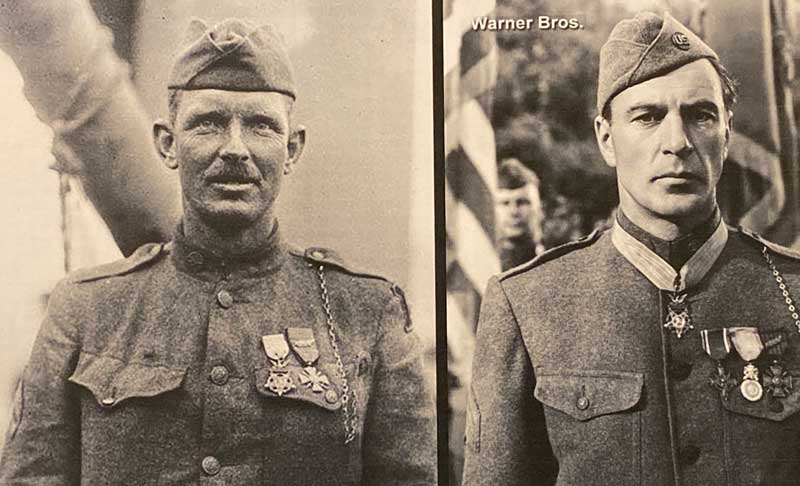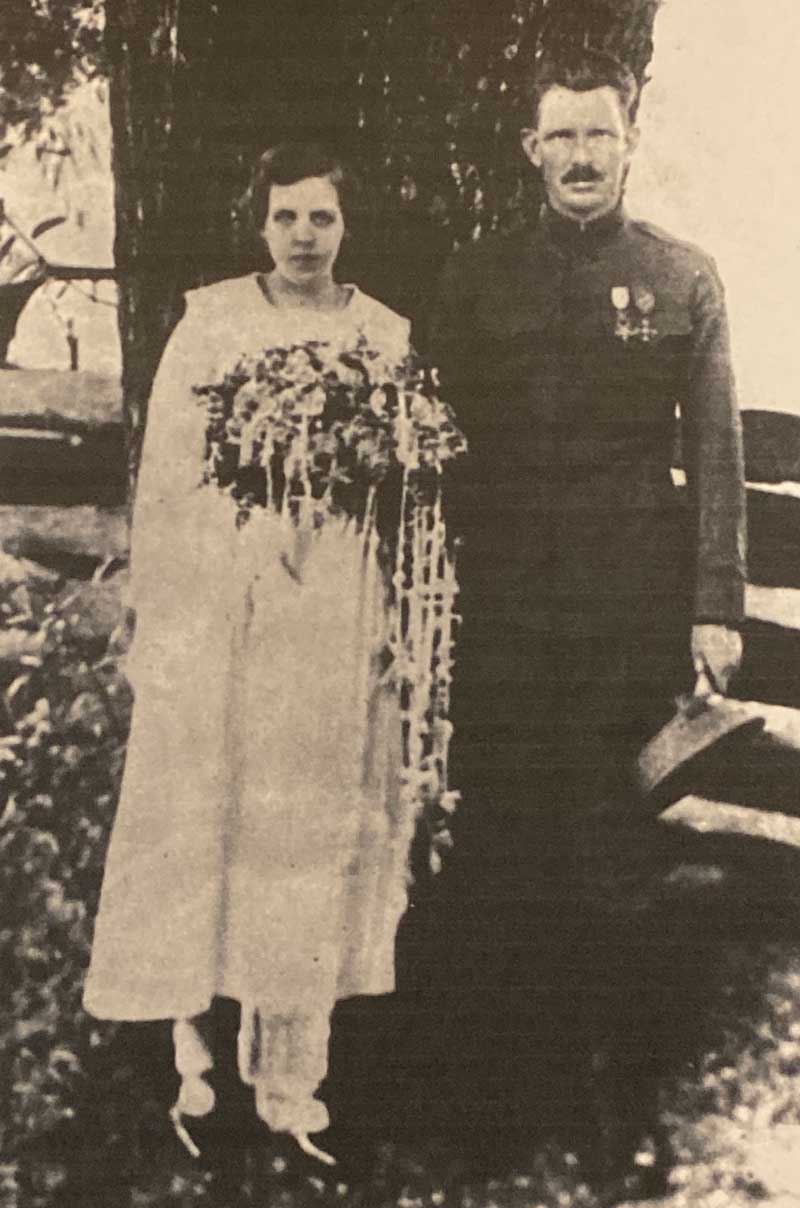One of my favorite subjects to write about in this august journal of truth has always been the lives of extraordinary people, especially when they are Christians, and most particularly when they have turned from a Devil’s Disciple to one of God’s Children – from sinner to saint. Those are the people I love to write about, to share with my readers their beliefs, their values, their strengths and weaknesses, their deeds, their fears, and their valor that we of the present might emulate to some degree.
I had only vaguely heard of Sergeant Alvin C. York (1887—1964) until perhaps 30 years ago, when I watched a video titled: “SERGEANT YORK”, made in 1941, which starred Gary Cooper as York, and 16 year-old Joan Leslie as Gracie Williams, the young woman who became Mrs. York in 1919. Even though the film isn’t totally historically accurate, it is sufficiently so, and eventually received Sergeant York’s endorsement. It won an Academy Award for Cooper for his role as an uneducated, hard working, hard drinking and carousing sinner from “Pall Mall, in the Valley of the Wolf”, in rural Tennessee, who in 1914 renounced his sinful ways and became a fundamentalist Christian -- one who was torn between his belief in religious pacifism and in patriotism, for he also dearly loved his country.

My wife and I rewatched the DVD of Sergeant York a couple of months ago, and I found the story even more fascinating this time, as York’s inner conflict -- the battle with his own conscience -- between his religious beliefs and his innate patriotism -- troubled him for years before the momentous events of October, 1918 changed his life forever, as this dirt poor, simple backwoods young farmer helped change the course of a vicious firefight between American and German troops during the Battle of Argonne, in France during WW1, and became a hero, and a legend.
What kind of a man was Alvin York? The answer is long, and complicated. He was born in Dec. of 1887, in the small backwoods village of Pall Mall, Tennessee, the third of eleven children. The York family was dirt poor, and Alvin grew up in a humble two-room cabin. Receiving only very minimal education due to the need to assist his father on the farm and hunt for food, he soon became a skilled marksman and an experienced woodsman. When his father died in 1911, Alvin, as the eldest child still living at home, was forced to help his mother in providing food, a meager income, and care for his younger siblings. He left his family’s hardscrabble farm only to work in railroad construction and occasionally as a logger in the forests of Tennessee. Always a hard worker, he never forgot his responsibility to provide for the welfare of his mother and siblings.
Like most of mankind, York had “feet of clay”, and during those years after his father’s death he became a heavy drinker, a trouble making carouser and womanizer, and was often involved in fights in dens of iniquity. Despite constant urging from his mother to change his life, and her continual prayers for the same, he persisted in his wicked ways, constantly getting drunk and always fighting. But in the winter of 1914, something happened that changed Alvin York forever. His childhood friend, Everett Delk, was beaten to death during a brawl in a saloon in Kentucky. Greatly troubled in spirit by his friend’s death, York one night attended a revival meeting led by Rev. H. H. Russell. He had often attended church as a young person, but this night he concluded that he had to change his sinful ways or end up just like his dead friend.
York accepted Jesus as his personal LORD and Savior, and changed his life. In 1914 he joined the Church of Christ in Christian Union, a very small denomination active in only three states (Tennessee, Kentucky, and Ohio), taught Sunday school classes for children, and sang in the choir. However, his new church had a strict Christian fundamentalist belief system that forbade drinking alcohol, dancing, movies, swimming, card playing, and other “worldly” activities. It also preached Christian pacifism, which was soon to give York a great deal of moral dilemma. He became an active member of the congregation, which included his 14-year-old future wife, Gracie Williams, and her family. For the next few years York worked hard to scratch out a living on his family farm in Pall Mall, but when the U.S. entered WW1 in April, 1917 he was certain that he would be drafted, causing an intensification of his pacifist beliefs. Eventually, at age 30, York received the dreaded draft registration notice. After consulting with his pastor, who advised Alvin to register for the draft as a conscientious objector, he did so in June, 1917 as required, but wrote on the card: “Don’t want to fight”. After a review of his request by both local and state draft boards, his status as a “C.O.” was denied because his church wasn’t an officially recognized Christian denomination. In Nov. of 1917 York was drafted into the U.S. Army and even though his “C.O.’ status was noted, he was sent to basic training in Georgia.
During basic training, York became a crack shot with his military rifle, but was considered as an “oddity” by his fellows because of his professed refusal to fight in combat. During this time he did have long and insightful discussions with both his company commander, Captain Edward Danforth, and his battalion commander, Major Edward Buxton, always discussing what God’s Word said about war and its justification. Buxton was also a devout Christian, and showed York many Biblical verses to counter his concerns. (These conversations were well presented in the 1941 film, “Sergeant York”, made many years later.)
The discussions with his superiors eventually had some affect on York’s pacifist beliefs, because it appears from the record that they did convince this reluctant warrior that war could sometimes be justified. Alvin was sent home to Pall Mall for a leave; when he returned after ten days he had a firm belief that God would allow him to fight for his country. The Scripture verses that did the most to convince York that defending his country was in God’s permissive will were from Matthew 22:20-21: “And He said to them, ‘Whose image and inscription is this?’ They said to Him, ‘Caesar’s’. And He said to them, ‘Render therefore to Caesar the things that are Caesar’s, and to God the things that are God’s’”.
York arrived in France with the 328th Infantry Regiment, part of the 82nd Infantry Division, near the end of May, 1918. Participating in combat in several areas of France, York and the 82nd were sent north to participate in the deadly Meuse-Argonne Offensive, one of the worst examples of human carnage in WW1 (as he would later vividly record in his diary). Being ordered to advance on the morning of Oct. 8, 1918, York’s unit was ordered to take “Hill 223” and then push forward and sever an important railroad line north of their position. That morning, the Americans did capture Hill 223. But as York and his unit moved from the hill through a valley, they rapidly came under heavy German machine gun fire from several sides, which caused heavy casualties and stopped their progress.
To eliminate the German guns, York’s Sergeant Early took him and 16 other men to try and work around to the rear of the German machine gun emplacements. They did succeed in doing this and advanced up one of the hills that was opposite to the bulk of the American forces, which were still pinned down. Early and his men captured a German command post, causing around 100 of the enemy, including a German major, to surrender. However, as Early’s unit was securing the captured enemy, other German machine gunners near the top of the hill observed what was happening, yelled to their comrades to lie down, and opened up on Sgt. Early and his men, killing 6 and wounding 3, including Early. This left Alvin York, who was a corporal by this time, in command of the remaining seven Americans.
Leaving these men to guard the prisoners, York now utilized his long experience as a noted sharpshooter; beginning prone, he began to pick off the German machine gunners, one by one. Soon he stood up, still firing at the enemy, and managed to avoid getting shot himself as he emptied his rifle. Six enemy soldiers left their trench and charged York with bayonets, but York drew his .45 cal. Colt auto pistol and dropped all 6 before they could stab him. Reloading his rifle, he continued firing at the German machine gunners. He knew he had shot many of the enemy and, not wishing to continue the killing, he yelled at them to surrender to him. Soon the captured German major was also ordering his men to surrender, which they did. York and his 7 comrades rounded up the captured enemy, which numbered around 100. They moved back toward the American lines, eventually capturing another 30 German troops. Corporal York soon delivered these enemy soldiers to his battalion headquarters, then rejoined his main unit and assisted in capturing the railroad they had been ordered to sever. Later, it was reported that during this heroic fight by York and his small band, 28 Germans had been killed and 35 enemy machine guns captured, which allowed the 328th to resume its assault and accomplish its goal.
Because of his heroism and battle accomplishments, York was promoted to Sergeant and was awarded the Distinguished Service Cross. He remained with his unit for the duration of the war, but on April 18, 1919 York’s medal was UPGRADED to the MEDAL OF HONOR, which was awarded to him that day by General John J. Pershing, Commander of the American Expeditionary Forces. York also was awarded the French ‘Croix de Guerre & Legion of Honor’. As he was being awarded the French medal by Marshal Ferdinand Foch, he told York: What you did was the greatest thing ever accomplished by any soldier by any of the armies of Europe.”

Always a humble man, Alvin York was amazed when, in late May, 1919 he was hailed as a national hero and given a ticker tape parade in New York City. Despite being offered great riches to endorse products, he refused them because he was eager to quickly return home to Pall Mall and to Gracie Williams (1900-1984). They married on June 7, 1919, and Alvin wore his military uniform with his medals. They had 10 children (3 of whom died in infancy). He spent most of his life trying to improve educational opportunities for the children of his area, opportunities that had been denied to him. A long time isolationist, he slowly changed his beliefs as the threat to the U.S. from fascist Nazi-ism (National Socialism) became more evident prior to 1941.
For decades York resisted filmmakers’ desires to make a movie about his life and his military exploits. Eventually he gave his permission to Warner Bros. studio to make this film, provided that Gary Cooper was the ONLY star that would portray him. After a protracted negotiation between York and the studio regarding exactly what was to be included in the film, York finally agreed to include his military heroism, which he had initially refused to have incorporated. York was a staunch isolationist, but the film, Sergeant York, was a strong call for military involvement in the already on-going war in Europe. After a short release in mid-1941 it was withdrawn because of extensive protests by the large number of American isolationists and several large and noisy pro-Nazi groups, which were active in the U.S. at that time, and not re-released until 1942, well after WW11 was raging. By then, York had abandoned his isolationist stance.
In 1941 Alvin York told his countrymen: “America must fight to keep liberty. Victory in 1918 gave us a lease to it, not a deed to it.” He had concluded that there were “just wars” and admitted, at least to himself, that fighting a war to protect one’s country WAS “rendering to Caesar”. And so he did. Alvin and Gracie married in 1919, and while they did not always live “happily ever after” (York was later harassed by the I.R.S. for several years over a tax problem), they remained faithful to each other and to God and Country, and served both honorably!
(I’m indebted to Kennedy Hickman and his article entitled, “World War 1: Sergeant Alvin C. York, published by ThoughtCo, March 17, 2017, from which I’ve freely quoted and paraphrased via my own words.)













